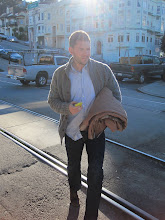
Stockton Thunder logo - the tee the guy on the street was wearing.
As far as I can tell, professional hockey in San Francisco dates back to the 1920's. The California Hockey League existed from 1928-1933 and included up to five teams each year from Oakland, San Francisco, and Los Angeles. The San Francisco Tigers played from the 1928-31 seasons. During the 1930-31 season, a second SF team, the Black Hawks, joined the league. In February of '31 the Tigers were revoked from the league, and soon after, in March of '31, the Black Hawks were disbanded. From there, San Francisco was represented by the Rangers until the end of the league in 1933. Interestingly enough, the nearby Oakland Shieks won the league title four out of the five years. The Hollywood Stars (formerly the Millionaires) won the only other title in 1932.
The Pacific Coast Hockey League (PCHL) existed in several incarnations - from 1928-31, from 1936-41, and from 1944-1952. Professional hockey next surfaced in San Francisco during the last PCHL years, with the SF Shamrocks playing from 1944-50 - never winning a title. In 1951, having shrunk to just a six team league, the PCHL merged with the Western Canada Senior Hockey League, adding three new franchises in Canada. One year later the league became the minor pro Western Hockey League (WHL).

1948 San Francisco Shamrocks Jersey
The minor pro Western Hockey League (WHL) operated from 1952-1974. The Winnipeg Warriors started in the league in 1955 and were relocated to San Francisco, bringing hockey back to the city in 1961. The San Francisco Seals played at the Cow Palace in Daly City from 1961-1966, creating a fierce rivalry with the Portland Buckaroos. The city of San Francisco won its first professional hockey title, the Lester Patrick Cup, in the 1962-63 season, defeating the Seattle Totems in the finals after eliminating the Buckaroos in a nasty seven game series. The following season the Seals defended the title, beating the Los Angeles Blades. As quickly as some stability had been brought to San Francisco professional hockey, change was on the way.
For the 1966-67 season the San Francisco Seals were moved across the bridge to play in the Oakland-Alameda County Coliseum. For that one year they were known as the California Seals, eliminating any ties to SF proper. The California Seals joined the National Hockey League (NHL) for the 1967-68 season and kept the team name in an attempt to appeal to both San Francisco and Oakland fans. However, after a few short months the team failed to generate any real interest from San Franciscans and was renamed the Oakland Seals. The name was later changed to the California Golden Seals in 1970. What a mess.
The California Golden Seals played in the NHL from 1970-76 before moving to Cleveland for a few years. But, make no mistake about it, professional hockey left San Francisco long before - when the seals left Cow Palace.

Early 1960's San Francisco Seals logo

Seals Jersey

California Golden Seals NHL Jersey
The Pacific Hockey League (PHL) was a low-level minor professional hockey league that existed for just two short years in the late 1970's. For the first time since 1966, pro hockey was back in San Francisco! The league took many of the names of the early WHL franchises and the Shamrocks were re-introduced in San Francisco for the '77-78 and 78'-79 seasons. In essence, the late 40's PCHL Shamrocks turned into the 60's WHL Seals, but were brought back as the PHL Shamrocks in the late 70's after the Seals stint in the NHL ended. Confused?

1978 San Francisco Shamrocks logo
The next and last stint of professional hockey came back to the Cow Palace in the 1994-95 season when the IHL came to town as the San Francisco Spiders. This experiment lasted only one season. Interestingly enough, the San Jose Sharks of the NHL played their first two seasons at the Cow Palace from 1991-93 before moving to the San Jose Arena (now HP Pavilion). It's too bad San Francisco wasn't awarded that franchise.

1994-94 San Francisco Spiders Jersey
So back to my inspiration, that guy on the street in the Stockton Thunder tee shirt. The Thunder are still going strong in the ECHL, celebrating their 5th season this year.

Stockton Thunder. San Francisco's nearest tie to professional hockey
It took me a while to sort out the history of hockey in San Francisco so let me know what you think. I wish I could have found some pictures of the early 1920's and 1930's teams. I did find out one cool fact though: during the 92'-93 season, on December 3, the San Jose Sharks played the Hartford Whalers at the Cow Palace. Rob Gaudreau scored the first hat trick in Sharks history. A guy from the city where my parents met, set a record, on my 11th birthday, against my favorite team, in the home of San Francisco hockey. You learn something new everyday.

4 comments:
Interesting post... and well researched!
Some of these jerseys are amazing! Love the green California Golden Seals jersey. And oof course the Shamrocks old school one.
Follow up post could be extinct NHL teams - Hartford Whalers, Quebec Nordiques, Winnipeg Jets, Minnesota North Stars, Colorado Rockies, Atlanta Flames, KC Scouts, Clev Barons, etc etc
Shamrocks and Shennanigans is what I always say!
I miss throwing M&Ms from the sky boxes at the Whale games
Cannot believe we met Gordie How up there!
Gordie Howe. Not Gordie How.
Post a Comment